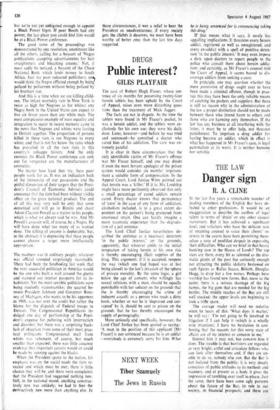Public interest?
DRUGS GILES PLAYFAIR
The case of Robert Hugh Fraser, whose sen- tence of six months for possessing twenty-four heroin tablets has been upheld by the Court of Appeal, raises even more disturbing ques- tions than the treatment of Mick Jagger.
The facts are not in dispute. At the time the tablets were found in Mr Fraser's pocket, he was a heroin addict, and the tablets were ex- clusively for his own use; they were his daily dose. Later, however—and before he was tried and sentenced—he consulted a doctor who cured him of his addiction. The cure was ex- tremely painful.
It is clear in these circumstances that the only identifiable victim of Mr Fraser's offence was Mr Fraser himself, and one may doubt if even the most fervent apologist of the prison system would consider six months' imprison- ment a suitable form of compensation. In the Appeal Court, Lord Justice Winn pointed out that heroin was a 'killer.' If it is, His Lordship might have more pertinently observed that only a small percentage of cured -addicts remain cured. Every doctor knows that permanency of 'cure' in the case of any form of addiction, alcoholism included, is to a great extent de- pendent on the patient's being protected from emotional strain. One can hardly imagine a more traumatic experience than the degrada- tion of a jail sentence.
The Lord Chief Justice nevertheless de- scribed the sentence as a necessary deterrent 'in the public interest,' on the grounds, apparently, that whoever yields to the initial temptation of taking heroin at his own risk is thereby encouraging illicit supplies of the drug. This argument, if it is accepted, reopens the way (which one had hoped was at last being closed) to the law's invasion of the sphere of private morality. By the same logic, a girl below the age of consent, who willingly has sexual relations with a man, should be equally punishable with her seducer on the grounds that she is thereby encouraging the crime of indecent assault; or a person who reads a dirty book, whether or not he is 'depraved and cor- rupted' by it, should be sent to prison on the grounds that he has thereby encouraged the supply of pornography.
More seriously and specifically, however, the Lord Chief Justice has been quoted as saying: 'A man in the position of this applicant [Mr Fraser] is not sentenced because he is an addict —everybody is extremely sorry for him. What he is being sentenced for is commencing taking this drug.'
If that means what it says, it surely has appalling implications. It threatens every heroin addict, registered as well as unregistered, and every ex-addict with a spell of punitive deten-
tion the public interest.' It may even impose a duty upon doctors to report people to the police who consult them about heroin addic- tion: and certainly, as Mr Fraser's counsel told the Court of Appeal, it seems bound to dis- courage addicts from seeking a cure.
In principle, one may question whether the mere possession of drugs ought ever to have been made a criminal offence, though in prac- tice this may have been the only reliable means of catching the pushers and suppliers. But there is still no reason why in the administration of the law a proper distinction should not be made between those who intend harm to others and those who are harming only themselves. If the law has any business at all interfering with the latter, it must be to offer help, not threaten punishment. To imprison a drug addict for having become an addict, which in effect is what has happened in Mr Fraser's case, is legal paternalism at its worst. It is neither humane nor sensible.






























 Previous page
Previous page